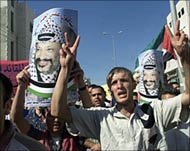Intifada swings power towards Islamists
Yasir Arafat is hanging on as the most popular leader of the Palestinian people, but his lead is slipping, according to pollsters in the West Bank and Gaza Strip.

The latest Palestinian opinion survey shows that backing for the resistance group Hamas has increased considerably, following an Israeli campaign of assassinations targeting the movement’s political leaders and activists.
The new poll, conducted by the Najah University in Nablus and released in late September, shows that more than a quarter of Palestinians support Hamas, whose founder and spiritual leader, Shaikh Ahmad Yasin was recently lightly injured in an Israeli airstrike.
Together with another resistance faction, Islamic Jihad, Hamas enjoyed the support of over 30% of Palestinians.
Just 28% of the respondents said they supported Fatah, the mainstream PLO faction headed by Palestinian leader Yasir Arafat.
Before the Intifada began in 2000, the Palestinian Islamists did not significantly benefit from Arafat and Fatah’s decline as the promise held out by Oslo failed to materialise – deserters from the mainstream nationalist cause simply chose to remain on the political sidelines and the Islamists’ support levels remained around the mid-teens.
The Intifada has changed that. Muslim leaders in the West Bank and Gaza Strip believe that nearly half of Palestinians support the Islamist movement in one way or another.
The Intifada effect
There seems to be a consensus that the political map in the West Bank and Gaza is changing as a result of the “Al-Aqsa” Intifada or uprising against the Israeli occupation – now in its fourth year.
 |
|
Arafat has lost out to Hamas |
The loss of confidence in the peace process to deliver a permanent agreement on acceptable terms has had a dramatic impact on the level of Palestinian support for violence against Israel, said Dr Khalil Shikaki, director of the Ram Allah-based Palestinian Centre for Policy and Survey Research.
Hamas has been able to capitalise on these sentiments. “I think Hamas’ option of resistance gained a lot of popular support during the second Intifadah. I am talking about the option and not Hamas as an organisation,” said Abd al-Aziz al-Rantissi, a Hamas spokesman.
“Any movement which resists the Israeli occupiers has popular support. We symbolise Palestinian strength in the face of Israeli attacks.”
Legitimacy
Today, Hamas is a force to be reckoned with. It has grown in strength since the outbreak of the Intifada.
It has also established a network of schools, clinics, orphanages and offers financial support to many of the impoverished Palestinians.
“The Intifada has lent legitimacy to Hamas,” Ziad Abu Amr, a member of the Palestinian Legislative Council said. “The peace process collapsed giving credence to Hamas’ opposition to the Oslo accords.
Also, when the Palestinian Authority (PA) and its factions, security services and individuals became involved in the Intifada – this meant they drifted towards the viewpoint of Hamas and not the peacemaking views of the Palestinian Authority.”
The success of the Islamist groups may also have contributed to the decision of Fatah to return to armed resistance under its military wing, the al-Aqsa Martyrs’ Brigades.
“Hamas gained a lot because of the corruption in the Palestinian Authority. Hamas presented itself as a clean movement,” said Abu Amr, who has written a book about Palestinian Islamist groups.
“The PA has been subjected to an Israeli campaign of destruction weakening its capabilities. Today, the PA is weak – also because of its bad governance – making the circumstances opportune for Hamas.”
Statistics compiled recently released by pollsters from the Jerusalem Media and Communication Centre show a vast majority of Palestinians – 82.7% – believe the PA is corrupt and lacks the will to reform.
The jury is out as to whether support for the Islamist movements will overtake Fatah.
|
“Recent Israeli attacks against Arafat and American attempts to find a replacement for him have only strengthened his position among his people” Ghassan Khatib, |
“It’s a pluralistic society, Fatah is the ruling party and it has been there all along,” Abu Amr explained. “Fatah has institutions, a bureaucracy and it is the largest employer.”
But the Islamists are hard on Fatah’s tail.
“I think the election box will answer that question,” al-Rantissi said. “At the moment and as the Intifada continues, the Palestinian street is controlled by all Palestinian factions – nationalists and Islamists.”
Allies
The Intifada has made Hamas and Fatah de facto allies against the Israelis. “If the peace process is revived, there may be changes like in 1996 when Hamas stood against the PA’s decision to implement peace agreements with Israel,” explained JMCC spokesman, Ghassan Khatib.
But Shikaki believes the Intifada has divided the Palestinian house even further. “It crystallised two important trends with Palestinian politics and society. A split between old and young within the nationalist movement has greatly constrained the PA leadership’s capacity to manage the current crisis.”
The second, a broader decline in power of the nationalists relative to the Islamists such as Hamas has created a long term challenge to the nationalists’ ability to lead the Palestinian people.”
That is one of Arafat’s major worries. The Palestinian president has always had to maintain a balance between US and Israeli demands and the desires of his people – many of whom have given their hearts and minds to Hamas.
Arafat’s position may be weakening, but the dynamics of Palestinian politics are also shoring up his support. “Recent Israeli attacks against him and American attempts to find a replacement for him have only strengthened his position among his people,” said Khatib.